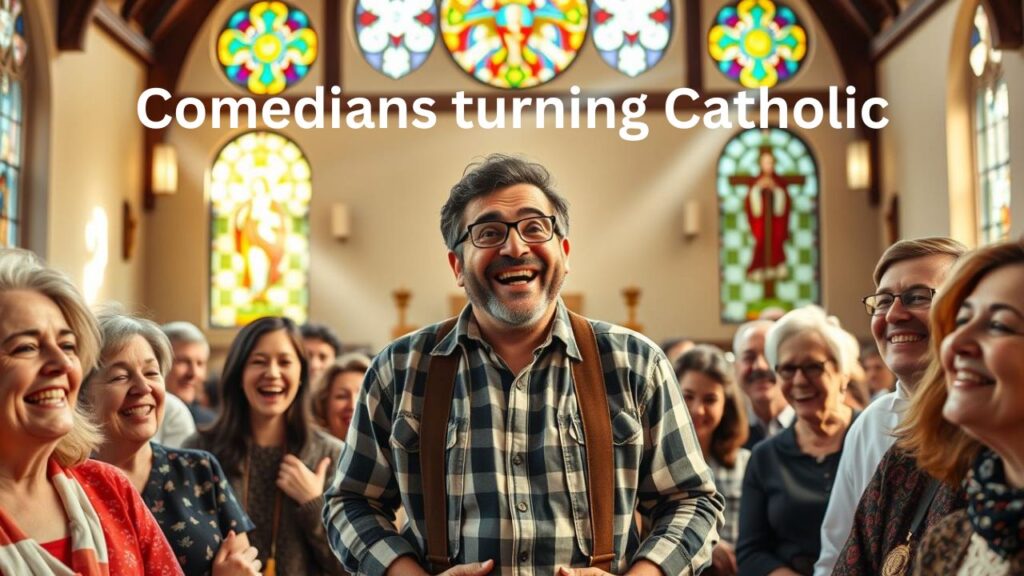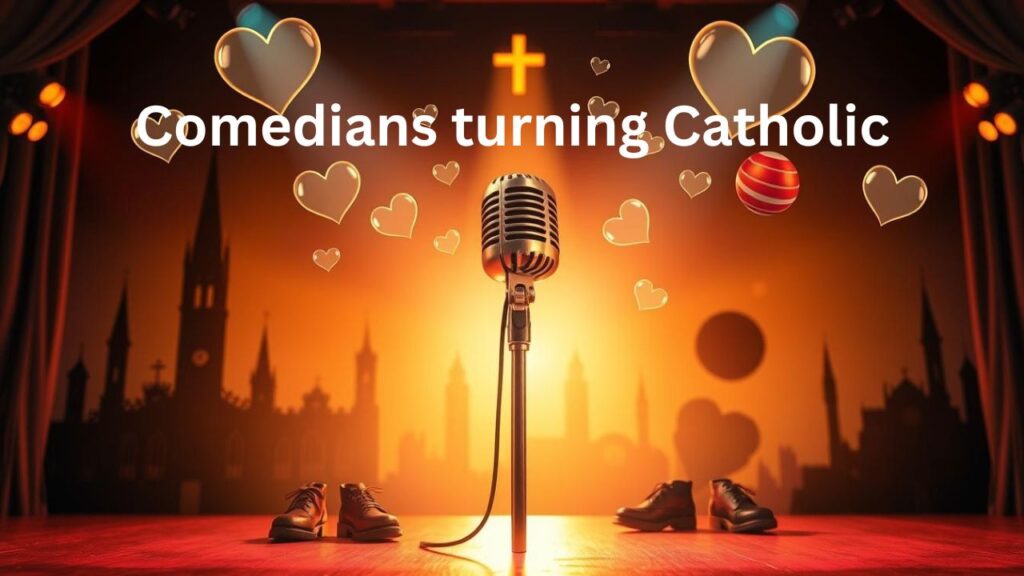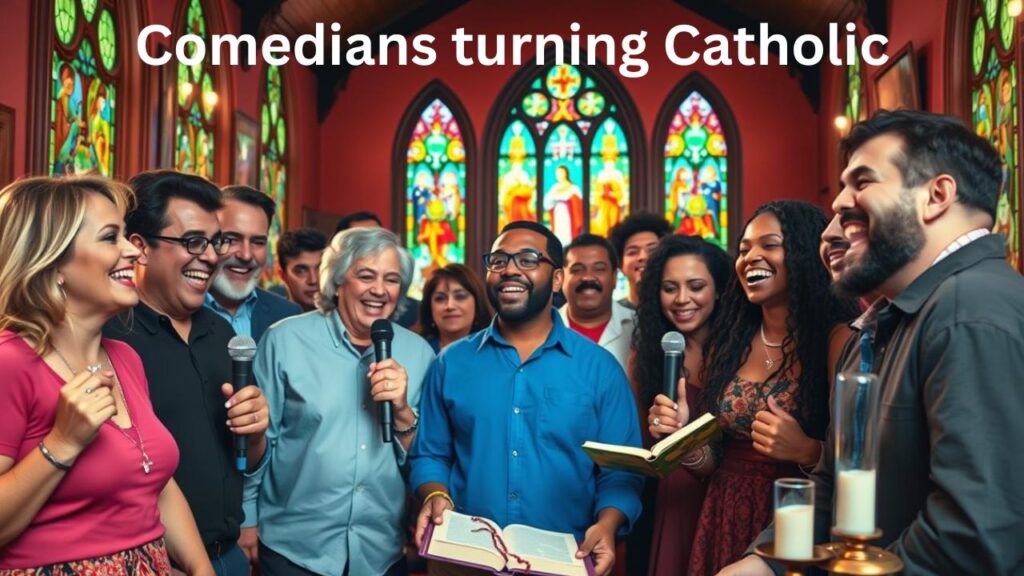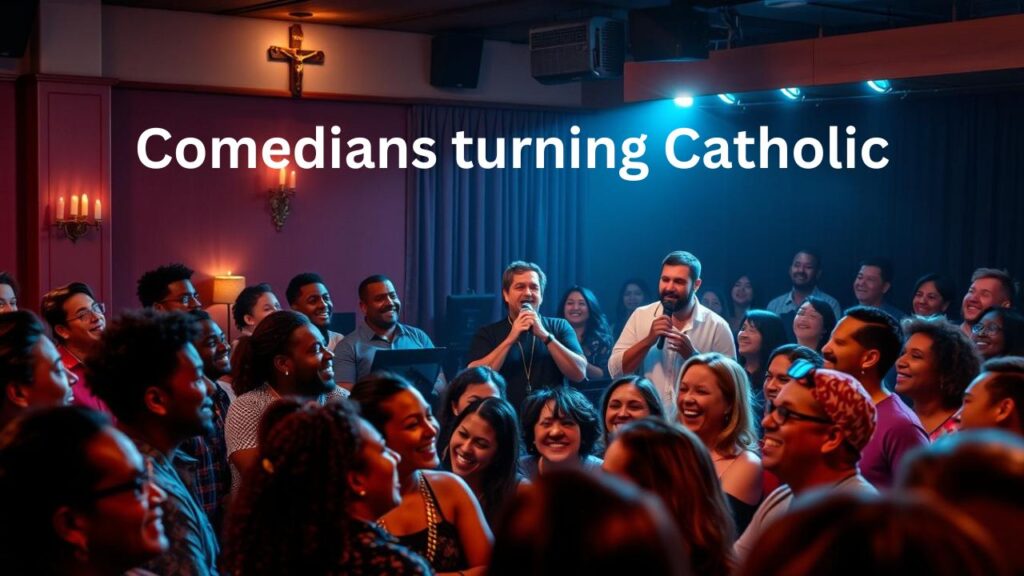Why are more comedians becoming interested in Catholicism? A unique comic provides an unexpected answer.

Comedians turning Catholic: Catholicism and comedy might seem like an odd pairing, but lately, a growing number of comedians have been embracing the Catholic faith. This unexpected trend raises questions about why this traditional religion draws some of the world’s most creative and irreverent minds.
Let’s dive into the journey of Shayne Smith, a tattooed comic with a past life in a biker gang. Smith, famous for his lively stories and dynamic performances, started a spiritual journey that brought him to Catholicism. For him, faith provided answers to big questions about life and gave him a deep sense of peace and connection. His new belief gives a surprising depth to his comedy, making his acts more meaningful.
Smith isn’t the only one:
Famous comedians like Jim Gaffigan, Kevin James, Stephen Colbert, Tom Leopold, Russell Brand, and Rob Schneider are either practicing Catholics or have turned to Catholicism. These comedians often include their faith in their performances, finding humor in the oddities of religious life, and they also use their stage to share their personal stories.

The Appeal of Knowledge:
Comedians turning Catholic: Catholicism has a long past and deep ideas that attract people looking for answers to life’s important questions. The Church’s philosophical and theological framework speaks to those who enjoy studying complex ideas. Famous converts like G.K. Chesterton and C.S. Lewis have written widely on the intellectual satisfaction they found in Catholicism, influencing generations of thinkers and artists, including comedians.
For instance, Stephen Colbert, who teaches Sunday school and is vocal about his faith, has mentioned the works of scholars such as Thomas Aquinas and Augustine as influential. These intellectual heavyweights offer a mode of thought that resonates with Colbert’s inquisitive nature and his search for truth.
Personal Narratives of Transformation:
Personal stories of transformation also play a significant part. Many comics are known for their poignant and often tumultuous life experiences. Catholicism’s focus on redemption and forgiveness provides a compelling narrative framework for those who have faced personal challenges.
Russell Brand, known for his wild antics and brash humor, has spoken freely about his struggles with addiction and his quest for meaning. Brand credits his faith journey, which includes studying Catholicism, as instrumental in his recovery process. His comedy now reflects a blend of irreverence and earnest spiritual searching, giving a unique viewpoint that’s both hilarious and thought-provoking
.
The Appeal of Ritual and Tradition:
Catholicism’s rich tapestry of rituals and traditions can be comforting to those wanting structure and continuity. Many find solace in the ritualistic practices of the Church, where the sense of belonging to something bigger than oneself is both satisfying and humbling.
For comedians like Jim Gaffigan, Catholic rituals aren’t just part of their daily lives but also material for their routines. Gaffigan’s humor often revolves around his family and faith, presented in a way that’s both relatable and funny without being preachy.

The Role of Community:
Comedians turning Catholic: The community aspect of Catholicism is another key reason. Stand-up comedy can be a lonely career, with long hours on the road and inconsistent work schedules. The tight-knit nature of Catholic parishes offers a ready-made support system, giving friendship, accountability, and encouragement.
Kevin James, known for his roles in “The King of Queens” and different comedy films, has shared how his Catholic faith and church community have supported him throughout his career. The sense of camaraderie and shared values among parish members offers a counterbalance to the often solitary and competitive nature of the entertainment business.
Spiritual Encounters:
For some, the turn toward Catholicism is driven by profound spiritual encounters. Shayne Smith, for example, recounts times when he felt an overwhelming sense of divine presence, which he fought to dismiss as mere coincidence. These situations became a cornerstone of his faith journey, providing him with both comfort and inspiration.
Similarly, Tom Leopold, a comic writer known for his work on “Seinfeld” and “Cheers,” found Catholicism after a series of personal tragedies. He remembers a feeling of being drawn to the Church, finding in its teachings a source of solace and strength during difficult times.
Influence of Catholic Media:
The accessibility of Catholic media has also added to this trend. With the rise of podcasts, YouTube channels, and social media focused on Catholic themes, comedians and others curious about the faith can easily explore and engage with its teachings.
Catholic personalities like Bishop Robert Barron, who use social platforms to share Catholic thought and apologetics, have gained large followings. These tools provide an entry point for people to learn about the faith at their own pace before making any commitments.

FAQ
What is the trend of comedians turning to Catholicism?
Comedians turning Catholic: Studies show more entertainers are becoming Catholic. They find a sense of connection and purpose in the church. This has led to more comedians sharing their Catholic religion through their jokes.
How do comedians use humor to show their Catholic faith?
Comedians turning Catholic: Catholic comedians say their faith shapes their comedy. They use jokes to connect with people and break down boundaries. The Church’s history of humor in teaching has motivated them.
What are some famous examples of Catholic comedians?
Jim Gaffigan, Jen Fulwiler, and Marcus Goodyear are well-known Catholic comedians. They talk about how their faith has affected their comedy.
How has the rise of Catholic comedians impacted current Catholic culture?
Catholic comedians have changed current Catholic culture. They use humor to share their faith and connect with others. This has helped break down assumptions and build community.
What difficulties do Catholic comedians face?
Comedians turning Catholic: Catholic entertainers face criticism from within and outside the Church. They are often questioned about their use of a fun and faith-based approach. Yet, many have found ways to overcome these obstacles and use humor to inspire.
What is the future of faith and comedy?
Conclusion:
Comedians turning Catholic: The trend of comedians embracing Catholicism shows how faith and creativity can intertwine in surprising ways. Whether drawn by intellectual curiosity, personal change, ritual, community, spiritual encounters, or modern media, these comedians find in Catholicism a source of inspiration and authenticity that enriches their lives and their work.
For Shayne Smith, the journey to Catholicism was both surprising and transformative, giving him a foundation that resonates strongly with his experiences as a comedian and a seeker. As more comedians share their stories, we see that faith can offer a profound and meaningful context for humor, giving both the comic and their audience laughter that’s deeply rooted in the human experience.

